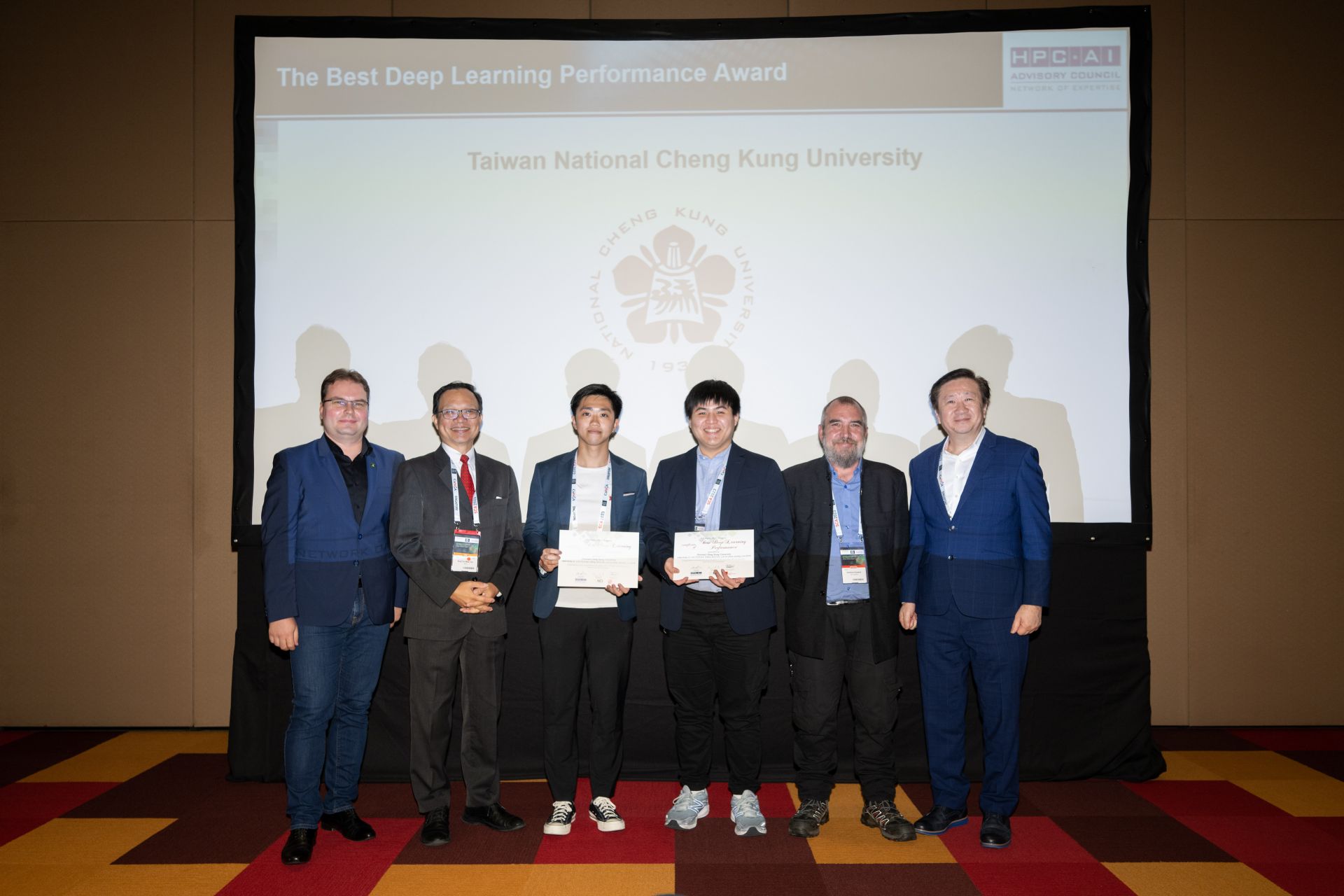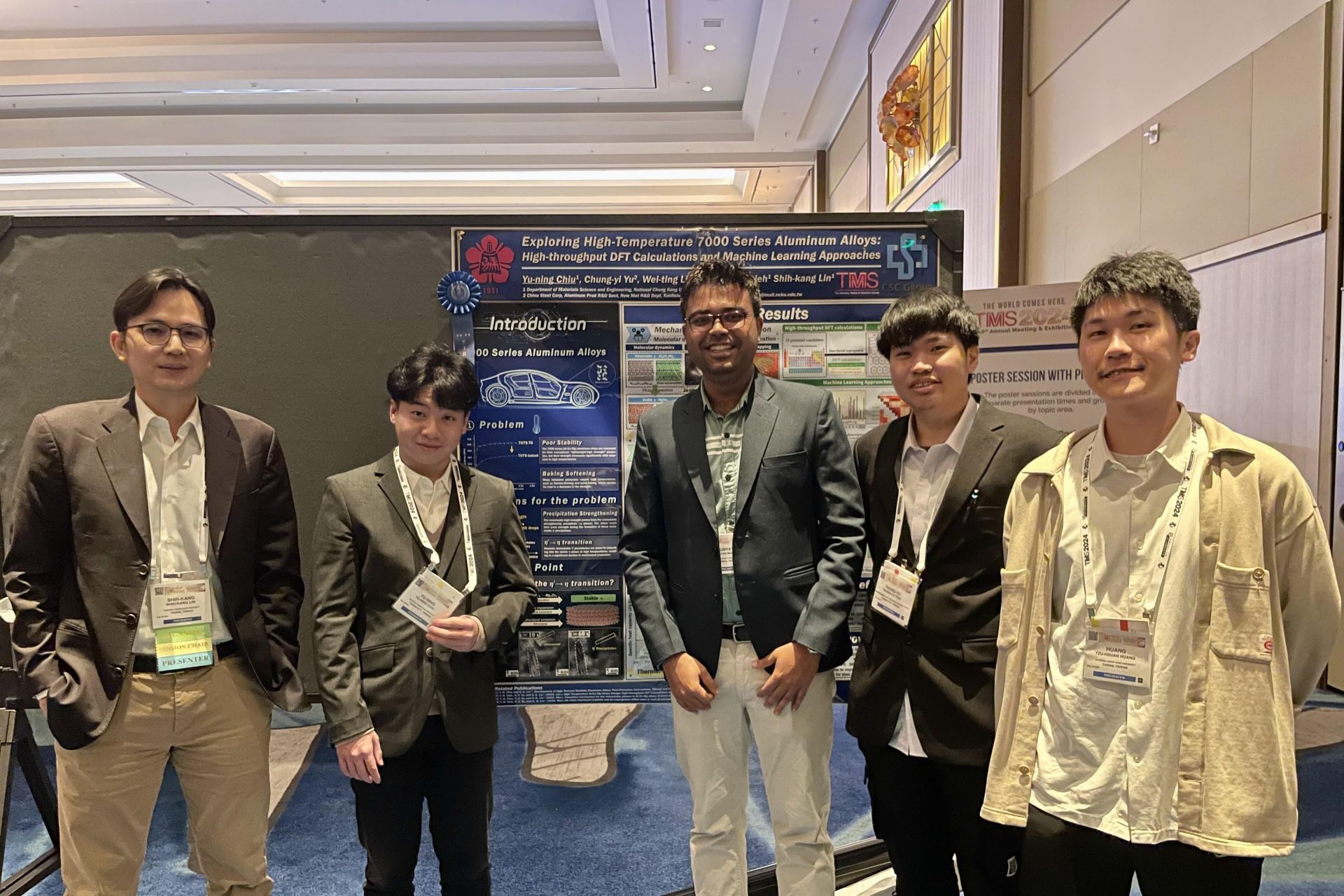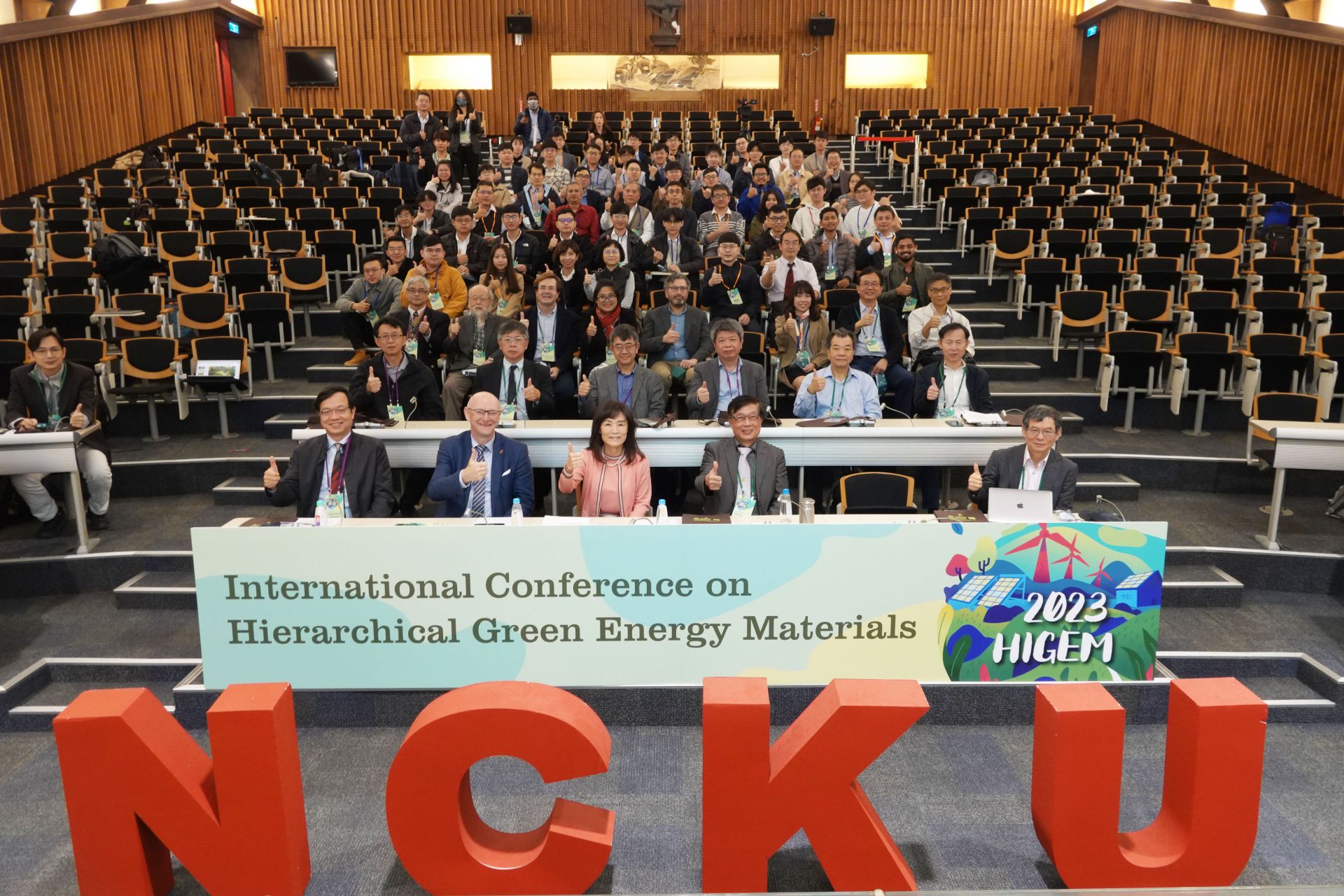SDG9
The NCKU High Entropy Technology Application Center partnered with Tekcore and TesCore to advance probe technology research
On the 14th, National Cheng Kung University (NCKU) High Entropy Technology Application Center signed a Memorandum of Understanding (MOU) with Tekcore and its wholly-owned subsidiary, TesCore. The collaboration will focus on developing high-entropy MEMS probes (HEA MEMS Probes) and commercial probe technologies, including industrialization, verification, pre-mass production testing, and market strategy evaluation. The goal is to leverage the unique advantages of high-entropy materials to overcome the limitations of existing MEMS probe technology and meet the advanced semiconductor testing demands. Additionally, Tekcore donated critical R&D equipment to support cutting-edge technology research and strengthen industry-academia collaboration.
MEMS probe cards play a key role in the semiconductor testing field, particularly driven by emerging applications in **artificial intelligence (AI), high-performance computing (HPC), 5G communications, and automotive electronics, with market demand continuing to rise. According to market research forecasts, from 2024 to 2028, the global probe card market is expected to grow at a compound annual growth rate (CAGR) of 10.1%, with MEMS probe cards expanding even faster at an 11.8% annual growth rate, becoming a crucial technology pillar in the testing industry.
The high-entropy MEMS probe technology developed by the NCKU High Entropy Technology Application Center offers several key advantages over traditional probe materials. It boasts high durability, with exceptional mechanical strength and fatigue resistance, significantly extending the lifespan of probes. Additionally, the technology provides high current stability, which reduces contact resistance and improves the reliability of high-power testing. Another benefit is its low maintenance cost, as it reduces the frequency of probe replacements. Furthermore, the technology is suitable for testing heterogeneous integration and system-in-package (SiP) chips. This technology has already secured multiple invention patents and is currently undergoing industrialization verification. Moving forward, the center plans to deepen its collaboration with the industry to accelerate market adoption and enhance Taiwan's global competitiveness in semiconductor testing technology.
The signing ceremony was held at NCKU, where Vice President Woei-Jer Chuang represented the university to sign the agreement with Chairman Kuo-Shih Huang of Tekcore. The event was attended by numerous dignitaries, including Director Liang-Ming Whang from the Innovation Headquarters, Professor Chuan-Feng Shih, Director of the NCKU High Entropy Technology Application Center and Department of Electrical Engineering, Director Meng-Hsueh Chiang from the Department of Electrical Engineering, Director Wen-Dung Hsu from the Department of Materials Science, Professor Bernard Haochih Liu from the Department of Materials Science, General Manager Chao-Quan Cai and Vice General Manager Wei-Min Li from Tekcore, and General Manager Yu-Yu Kao from TesCore, all of whom were present at the ceremony.
Vice President Woei-Jer Chuang of NCKU remarked that Tekcore's donation of equipment and TesCore's technical collaboration will contribute to NCKU's efforts in cultivating high-level semiconductor talent, while also advancing forward-looking research in the semiconductor and emerging technology fields. On the other hand, Chairman Kuo-Shih Huang of Tekcore emphasized that the donation not only demonstrates the depth of industry-academia collaboration but also represents a long-term investment in higher education and technological innovation. He expressed his hope that through NCKU's cutting-edge research capabilities, Tekcore can make breakthroughs in the global probe market, seizing new opportunities in the emerging technology landscape.
The equipment donated by Tekcore includes Thamos Swan MOCVD, thermal evaporators, electron beam evaporators, fluorescence spectrometers, high-temperature furnace tubes, point testers, and exhaust gas treatment systems, all of which are key professional research and development tools for advanced semiconductor production. These will be used by NCKU for research in the high-entropy materials field, strengthening the collaboration bridge between academia and the industry. Professor Chuan-Feng Shih pointed out that these instruments will focus on the development of high-entropy semiconductors and energy storage components, while also aligning with top international research institutions to drive synchronized progress in both academic and industry technologies.
The NCKU High Entropy Technology Application Center, established in 2022 and affiliated with the NCKU Innovation Headquarters, is directed by Professor Chuan-Feng Shih from the Department of Electrical Engineering. The center is dedicated to forward-looking research on the applications of high-entropy materials, including semiconductor device technologies, optoelectronics and passive components, energy storage and magnetic materials, and high-frequency communication components. Since its establishment, the center has undertaken several industry-academia cooperation projects with publicly listed companies and has actively expanded international collaborations. It continues to promote deep cooperation between academic research and industry applications.
Tekcore Technology Co., Ltd. is a leading LED chip manufacturer in Taiwan and has recently expanded into the semiconductor technology sector, focusing on advanced semiconductor testing and heterogeneous integration technologies. Through material innovation and precision manufacturing techniques, Tekcore aims to enhance the competitiveness of the semiconductor industry chain. To deepen its research and industrialization in probe card technology, Tekcore established its wholly-owned subsidiary, TesCore, with a team of members from the semiconductor industry who bring extensive experience in R&D, production, and market sales. In addition to possessing core technologies such as CPC, VPC, and WAT, TesCore plans to further develop MEMS probe technology and its commercial applications. The company is also actively integrating academic and industry research resources to drive the next generation of semiconductor testing solutions and enhance its market competitiveness.
MEMS probe cards play a key role in the semiconductor testing field, particularly driven by emerging applications in **artificial intelligence (AI), high-performance computing (HPC), 5G communications, and automotive electronics, with market demand continuing to rise. According to market research forecasts, from 2024 to 2028, the global probe card market is expected to grow at a compound annual growth rate (CAGR) of 10.1%, with MEMS probe cards expanding even faster at an 11.8% annual growth rate, becoming a crucial technology pillar in the testing industry.
The high-entropy MEMS probe technology developed by the NCKU High Entropy Technology Application Center offers several key advantages over traditional probe materials. It boasts high durability, with exceptional mechanical strength and fatigue resistance, significantly extending the lifespan of probes. Additionally, the technology provides high current stability, which reduces contact resistance and improves the reliability of high-power testing. Another benefit is its low maintenance cost, as it reduces the frequency of probe replacements. Furthermore, the technology is suitable for testing heterogeneous integration and system-in-package (SiP) chips. This technology has already secured multiple invention patents and is currently undergoing industrialization verification. Moving forward, the center plans to deepen its collaboration with the industry to accelerate market adoption and enhance Taiwan's global competitiveness in semiconductor testing technology.
The signing ceremony was held at NCKU, where Vice President Woei-Jer Chuang represented the university to sign the agreement with Chairman Kuo-Shih Huang of Tekcore. The event was attended by numerous dignitaries, including Director Liang-Ming Whang from the Innovation Headquarters, Professor Chuan-Feng Shih, Director of the NCKU High Entropy Technology Application Center and Department of Electrical Engineering, Director Meng-Hsueh Chiang from the Department of Electrical Engineering, Director Wen-Dung Hsu from the Department of Materials Science, Professor Bernard Haochih Liu from the Department of Materials Science, General Manager Chao-Quan Cai and Vice General Manager Wei-Min Li from Tekcore, and General Manager Yu-Yu Kao from TesCore, all of whom were present at the ceremony.
Vice President Woei-Jer Chuang of NCKU remarked that Tekcore's donation of equipment and TesCore's technical collaboration will contribute to NCKU's efforts in cultivating high-level semiconductor talent, while also advancing forward-looking research in the semiconductor and emerging technology fields. On the other hand, Chairman Kuo-Shih Huang of Tekcore emphasized that the donation not only demonstrates the depth of industry-academia collaboration but also represents a long-term investment in higher education and technological innovation. He expressed his hope that through NCKU's cutting-edge research capabilities, Tekcore can make breakthroughs in the global probe market, seizing new opportunities in the emerging technology landscape.
The equipment donated by Tekcore includes Thamos Swan MOCVD, thermal evaporators, electron beam evaporators, fluorescence spectrometers, high-temperature furnace tubes, point testers, and exhaust gas treatment systems, all of which are key professional research and development tools for advanced semiconductor production. These will be used by NCKU for research in the high-entropy materials field, strengthening the collaboration bridge between academia and the industry. Professor Chuan-Feng Shih pointed out that these instruments will focus on the development of high-entropy semiconductors and energy storage components, while also aligning with top international research institutions to drive synchronized progress in both academic and industry technologies.
The NCKU High Entropy Technology Application Center, established in 2022 and affiliated with the NCKU Innovation Headquarters, is directed by Professor Chuan-Feng Shih from the Department of Electrical Engineering. The center is dedicated to forward-looking research on the applications of high-entropy materials, including semiconductor device technologies, optoelectronics and passive components, energy storage and magnetic materials, and high-frequency communication components. Since its establishment, the center has undertaken several industry-academia cooperation projects with publicly listed companies and has actively expanded international collaborations. It continues to promote deep cooperation between academic research and industry applications.
Tekcore Technology Co., Ltd. is a leading LED chip manufacturer in Taiwan and has recently expanded into the semiconductor technology sector, focusing on advanced semiconductor testing and heterogeneous integration technologies. Through material innovation and precision manufacturing techniques, Tekcore aims to enhance the competitiveness of the semiconductor industry chain. To deepen its research and industrialization in probe card technology, Tekcore established its wholly-owned subsidiary, TesCore, with a team of members from the semiconductor industry who bring extensive experience in R&D, production, and market sales. In addition to possessing core technologies such as CPC, VPC, and WAT, TesCore plans to further develop MEMS probe technology and its commercial applications. The company is also actively integrating academic and industry research resources to drive the next generation of semiconductor testing solutions and enhance its market competitiveness.
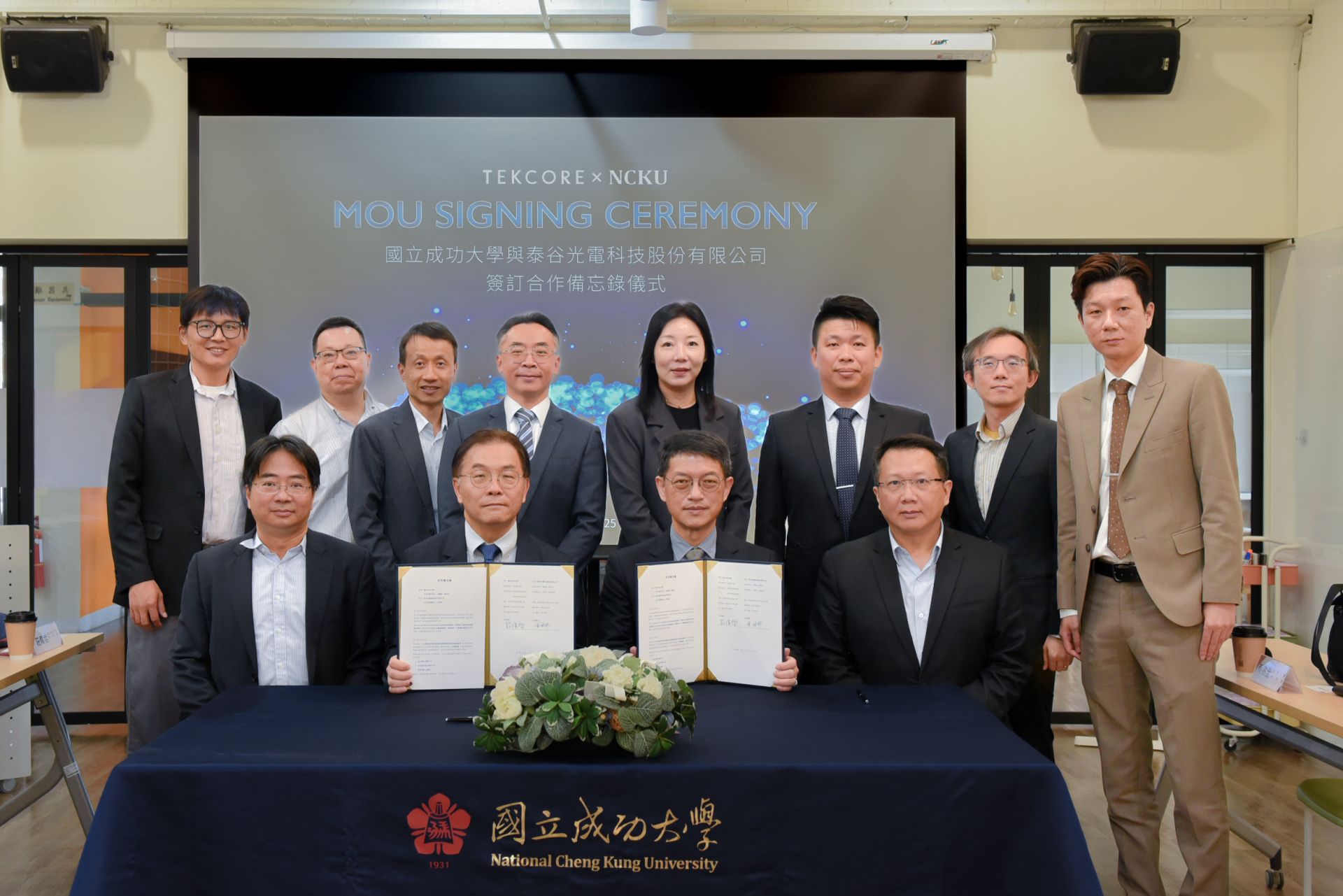
NCKU has teamed up with Tekcore to pioneer research in cutting-edge probe technology. The two parties signed a MOU on April 14, marking the beginning of their collaboration in advancing this forward-looking technology.
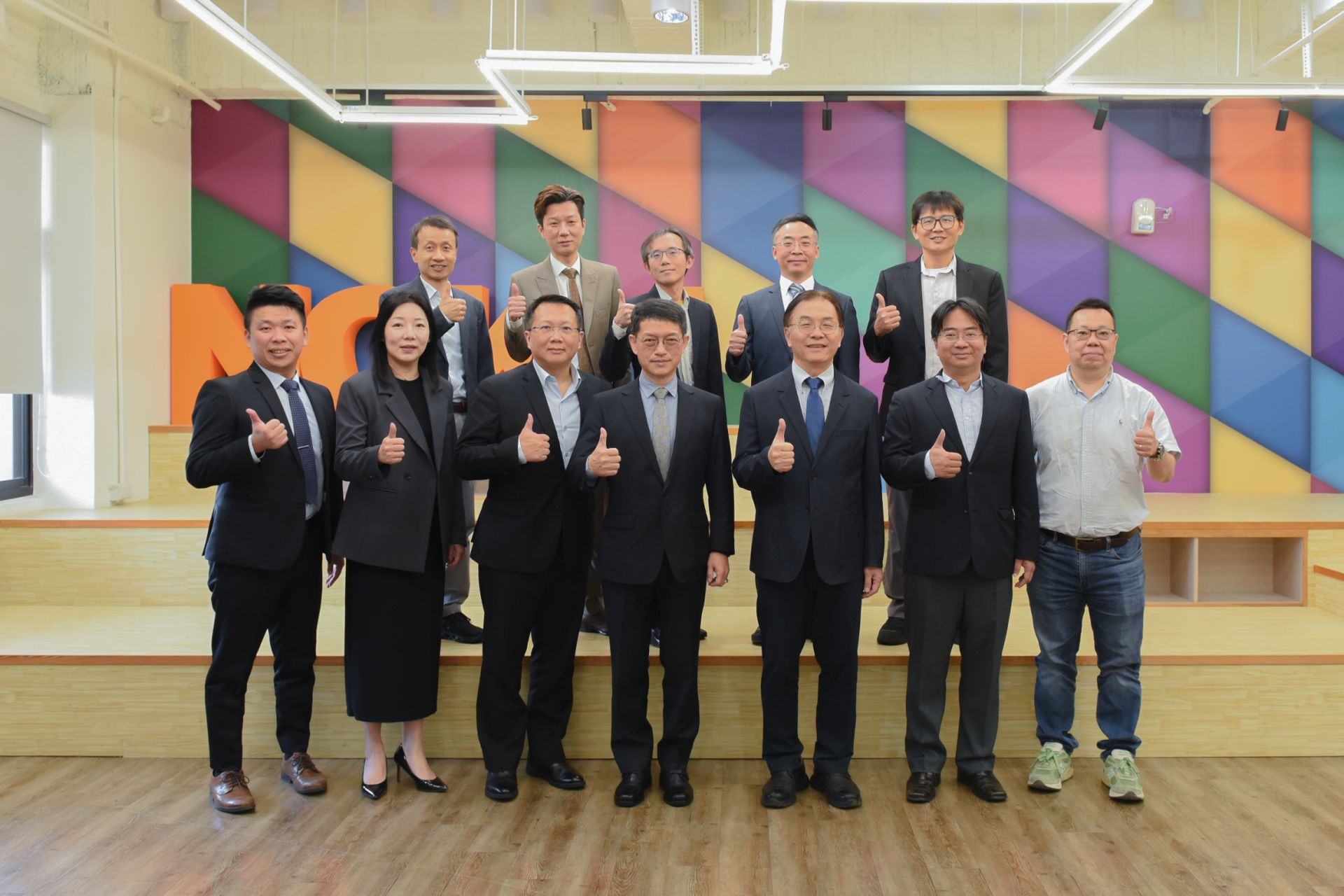
The officials from NCKU, along with distinguished guests from Tekcore and TesCore, posed for a group photo.
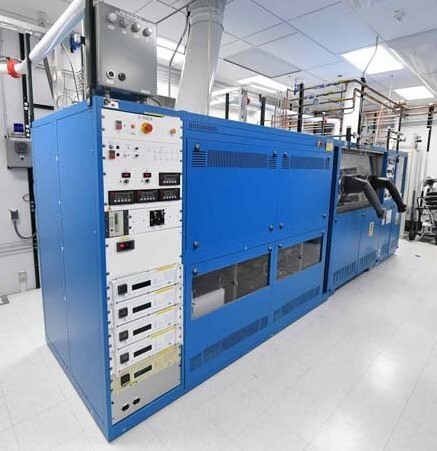
Tekcore has donated critical research and development equipment to NCKU, supporting the university's cutting-edge technology research and deepening the collaboration between academia and industry.




